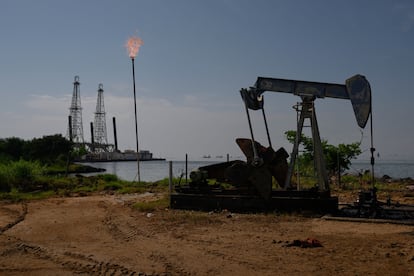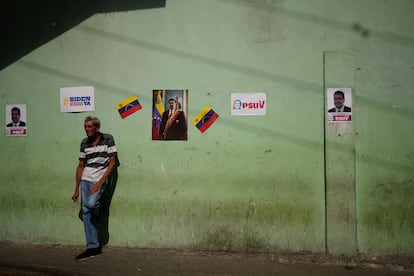Venezuela experiences an economic recovery in times of electoral uncertainty
National GDP is expected to grow by 4.2% in 2024 and oil production now exceeds 820,000 barrels per day after years of catastrophic figures

In an election year of uncertain outcome, Venezuela has experienced some economic improvement after years of financial difficulties. In its latest study, the research firm Ecoanalítico — widely consulted by the specialized media to analyze the behavior of the economy due to the lack of data from the Central Bank of Venezuela — calculated a growth rate of 4.2% for the nation for 2024. The trend is based on improvements in trade and services, driven by the oil and mining sector, in addition to the growth of sectors such as food processing and pharmaceutical production, against an economic backdrop of increasingly normalized relations between the Chavista administration and the private sector.
The energy sector, the country’s economic engine, experienced an improvement compared to previous times. Although it is still far from the 2.5 million barrels it produced at the height of the oil boom, today it produces 820,000 barrels, 70,000 more than a year ago and almost 20% more than two years ago. It is also true that the international sanctions imposed by the White House have prevented this figure from increasing even further. Asdrubal Oliveros, director of Ecoanalítico, asserts that the Nicolás Maduro administration has had some success in its strategy to curb the hyperinflation unleashed in 2018, and that this year it may be averaging 50%, after carrying out an unannounced and severe fiscal and economic adjustment. “The government has more money, it has been increasing its income, but public spending is still much lower than the levels of other years.”
Oliveros now wonders about the exchange rate stability of these few months, and fears that the political tensions that may arise will produce some type of adjustment due to the overvaluation of the exchange rate, with its corresponding inflationary impact. Econalítico’s calculations tend to resemble those of other economists, who predict growth for the country and rule out the development of a new static agenda. “What is at stake in Venezuela in these elections may be the speed with which the country can emerge from the crisis,” says Asdrúbal Oliveros.
The areas of economic growth that were observed are not regular or widespread, but rather focus on very specific areas of the map, with a particular impact on the Caracas-Valencia axis, somewhat less in the Zuliana region, Puerto la Cruz, the island of Margarita and perhaps Barquisimeto. Dense areas of inner Venezuela are still mired in economic depression and a serious crisis of public services. Income poverty in Venezuela currently affects 85% of the population, more than double its average in previous decades.
Other analysts, however, consider that these positive figures might be satisfactory in any other economic context, but that they are insufficient for an economy like Venezuela’s, urgently in need of double-digit growth for several years in order to return to what it once was. Venezuela’s industries are largely idle, its oil sector is damaged, its market greatly reduced by the diaspora and the destruction of the population’s purchasing power. And the traditional engines of an economy like the Venezuelan one, construction and manufacturing, are practically absent from the growth map, or just have a token presence.

Despite the unease about the economy, short and medium-term expectations for the Venezuelan economy are positive, and could even become optimal, according to all economic observers, in the event of a transition to democracy that enables the country to reestablish, without sanctions, its relations with the international financial community, accessing credits and loans to undertake reconstruction.
The improvement of the economy could also materialize if Maduro retains power, says Ecoanalítico, although it would be more modest, in his opinion. It is likely that the Chavista administration will do everything possible to raise capital and obtain exploration licenses, looking for spaces to negotiate and be accepted in the financial community. The impact, however, would be much more limited in terms of inflation and growth.

“The starting point to evaluate the power of the growth of the Venezuelan economy is the quality of the electoral result,” says Luis Oliveros, dean of the School of Economics at the Metropolitan University. “Many things depend on that. In the hands of Nicolás Maduro I see the economy growing as well, not as it would grow if the opposition were to take power, but I do believe that oil production can continue to increase in a context in which sanctions remain flexible and individual licenses are granted for the exploitation of the Venezuelan oil fields. The problem is what happens if the electoral results are not robust, if things do not go well, if sanctions are toughened and the international community closes the door to Venezuela,” says the economist.
“Wages for work in 2024 end up representing barely 10% of GDP, when in a year like 2010 it exceeded 40% of the total economy,” explains the economist Rodrigo Cabezas, professor at the University of Zulia and former minister of finance, to illustrate the destruction of the value of labor. “GDP growth during 2022-2024 is not only moderate compared to the loss of 75% of the total economy in the Maduro years, but it is also very unequal by sector.”
Cabezas is not so optimistic when evaluating the future of Venezuela in the hands of Nicolás Maduro. “It would aggravate the Venezuelan crisis. The slight relief to the economy, as a result of U.S. licenses for oil production and increased imports, would come to a standstill. The truth is that sustainable economic growth is only possible with a political change that recovers the levels of investment necessary to grow.”
Sign up for our weekly newsletter to get more English-language news coverage from EL PAÍS USA Edition
Tu suscripción se está usando en otro dispositivo
¿Quieres añadir otro usuario a tu suscripción?
Si continúas leyendo en este dispositivo, no se podrá leer en el otro.
FlechaTu suscripción se está usando en otro dispositivo y solo puedes acceder a EL PAÍS desde un dispositivo a la vez.
Si quieres compartir tu cuenta, cambia tu suscripción a la modalidad Premium, así podrás añadir otro usuario. Cada uno accederá con su propia cuenta de email, lo que os permitirá personalizar vuestra experiencia en EL PAÍS.
¿Tienes una suscripción de empresa? Accede aquí para contratar más cuentas.
En el caso de no saber quién está usando tu cuenta, te recomendamos cambiar tu contraseña aquí.
Si decides continuar compartiendo tu cuenta, este mensaje se mostrará en tu dispositivo y en el de la otra persona que está usando tu cuenta de forma indefinida, afectando a tu experiencia de lectura. Puedes consultar aquí los términos y condiciones de la suscripción digital.








































